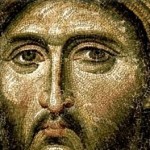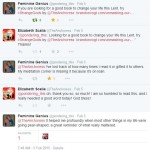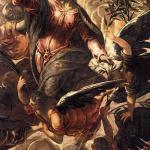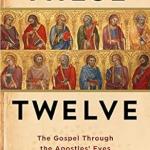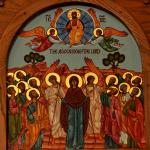Does anyone remember this little book, Why Am I Afraid to Tell You Who I Am?, by John Powell, SJ? I remember a friend sharing her copy with me in the late 1970’s, and I think we were both too young to really benefit from it. I may pick it up again, because I’m tired of being bashful, and I’m tired of feeling hesitant around people simply because in my life I have been bullied.
I want to say, “screw that, so what?” and just move on, already. I want to be done with all the old tapes and learned behaviors. I want to get beyond memory and bad messages. I’m sick of shielding.
It has been a remarkably rough Lent, so far, a true desert walk. I was raised in the desert of the American Southwest, and in ten years I never found any beauty there, except in the fleeting glimpses of wild horses, running in the distance.
I wanted to run, too.
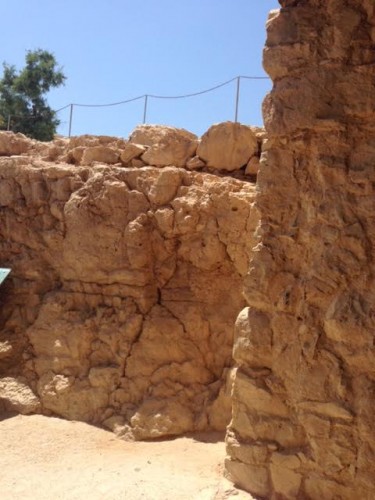
But then a thought comes behind it; only in a place this empty, this rugged and unbearably hot, this dauntingly vast; only in this place of naked challenge and certain defeat could a hoped-for promise of redemption take hold and thrive. God chose his worksite well.
Life lashes at us. No one escapes it without experiencing at least one episode of excruciating pain, and loss: loss of a loved one, certainly, but also loss of one’s own dignity, of a sense of safety or security, a loss of hope; a loss of one’s sense of place, or worth; a loss of belief in the goodness of others; a loss of belief, full-stop. These losses, particularly if they come early and often, pull you into the desert, while you are still dewy with youth, and if you’re lucky, you wander for a very long time, but you survive.
And if you’re looking for them, eventually, the blessings become apparent; the promised land appears on the horizon, and you finally know that if you only keep moving, it will become enlarged in your sight, and everything will make sense, and then there will be glory.
I came to love the deserts of Israel over the course of a few short days, because I recognized myself — or, rather, various stages of myself, and everything I have ever known — within all that was stark, and empty and golden everywhere. Holy mystery was there, everywhere, but I wasn’t ready, and pneumonia sent me home, just outside of Jerusalem, a decision I have regretted making. Whether I will ever be ready, or have the chance to go again, is anyone’s guess. I leave it up to God.
But in those short days, I had learned to love the empty, and that is a good thing, because a half-year of pulmonary and autoimmune adventures have rather stuck me there. In the empty. Any ambitions I may have harbored became sidelined, and the future was kissed up to heaven.
Tonight, I watched this short video of 86 year-old Jean Vanier, Catholic philosopher and founder of the L’Arche (Ark) communities for the mentally disabled. And something clicked. Vanier has just been awarded the Templeton Prize, for his contributions toward human understanding of the spiritual life, and here he speaks very simply, of what makes builds a human being up, and makes a human life. It is about not being afraid to show people who you are; not being afraid to love and be loved. “People are filled with fear…we are all in a state of protection.”
Watch this; it’s only four minutes long.
We’ve heard this before in bits and pieces. Pope Benedict XVI emphasized that everyone needs to hear “it is good that you exist.” Merton said we all gad about shining like the sun. Schmemann said, “every evil screams out one message: ‘I am good!'” The notion that every one one of us is “engaged in great battle” has been attributed to many. Mr. Rogers said, “it’s you I like.”
Somehow, Vanier puts it all together in plain words, in under five minutes, and it all makes sense.
The older I get, the more difficult each Lent becomes. Perhaps that is because I know I have so much more to learn, and I’m nearer my end, so I have to get to it and no more lollygagging. And perhaps, I am finally maturing enough to learn from what is hard. This season has been relentlessly painful and my armor has been fully pierced. Every day there are tears; a few times there has been actual wailing and bawling and the sorts of huffs and shivery after-sighs that I have not experienced since I was very, very young.
I know it is instructive; I hope it is healing, too. I have much to learn, but I also need a great deal of healing and I’m begging for it, even though I know to be careful about asking for things, because nothing is free, save grace.
But I forget, sometimes, that healing is very hard work, and it requires patience and also a fearlessness I have been unwilling to embrace. When you can’t self-medicate because you’ve given up all the comfort foods for Lent, then “ready or not,” embrace them you must.
But in listening to Vanier, I remembered something, and in remembering, I realized that this heavy Lent is all part-and-parcel of a journey toward something I had asked for back in 2012:
I want to love, again.
Youth cannot be reclaimed, and I would not want to, but increasingly I feel a need—a calling, perhaps—to find a way to reach back and recapture one aspect of my youth: a willingness to be a little naive, to take people as they are, rather than as I believe I can classify them. It was how I lived before I became very engaged with politics and religion and chose labeling over loving.
I meant it when I wrote, and I have tried mightily to hold to it, and to grow with it. I’ve failed sometimes, for sure, but also succeeded better than anyone reading me in 2006 might have imagined.
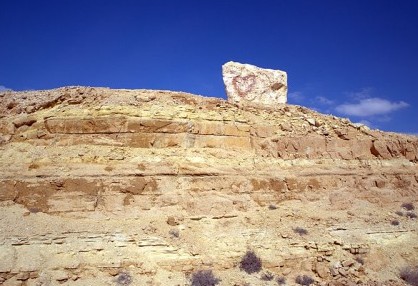
I admit it. As Vanier says, I am fragile. I feel fragile because every day of this Lent has been harrowing.
Harrowing, this desert, which is becoming denuded of built-in shields and safeties and begins to stretch out before me, empty and golden, everywhere.
My salvation is before me. The horizon is glistening with it. If I can just keep moving.
Related:
Jean Vanier, a longer version of his remarks on video
Lent, Everything I love I hurt

